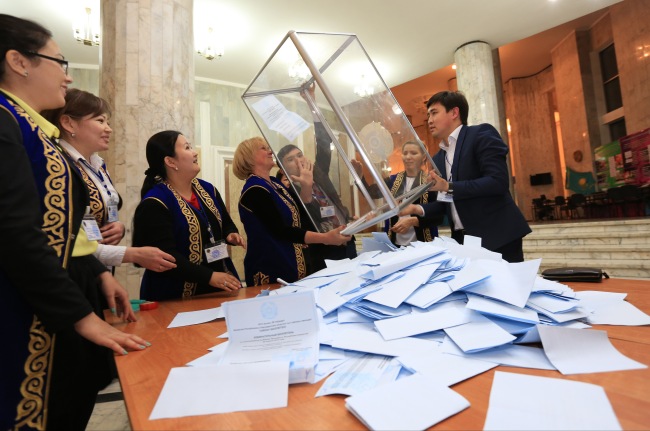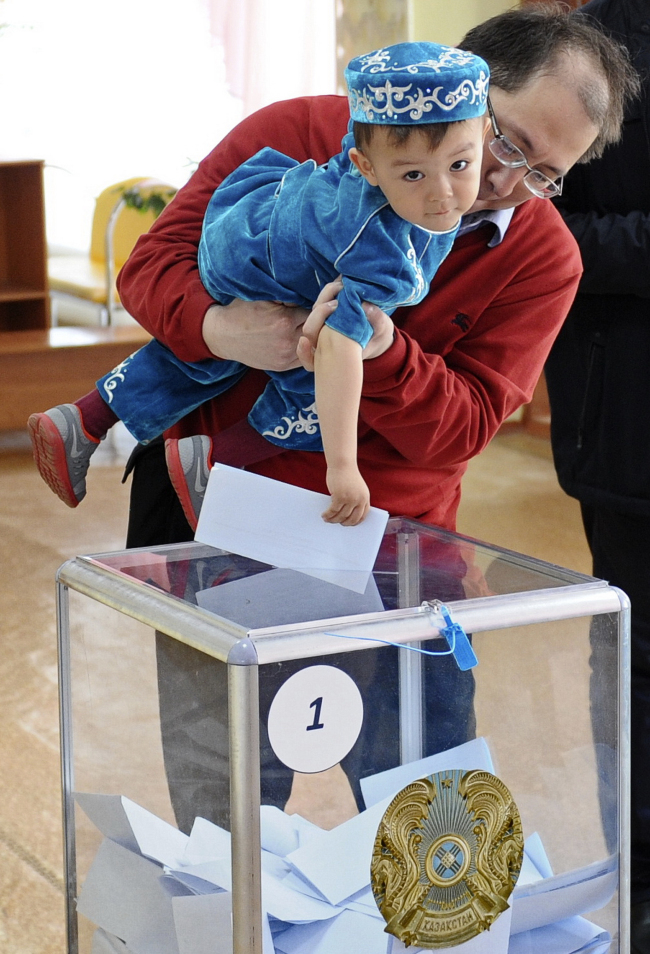Incumbent strongman wins Kazakhstan’s one-sided election
Political stability boosts Nazarbayev’s popularity, but his successor still not in sight
By Korea HeraldPublished : April 27, 2015 - 20:16
ASTANA ― Kazakh voters patiently lined up in half-hour queues at nationwide polling stations Sunday in the presidential election, giving the incumbent strongman who has ruled the country for a quarter-century a fresh term in a landslide victory.
President Nursultan Nazarbayev won 97.7 percent of the vote, over the Communist People’s Party of Kazakhstan Turgun Syzdykov’s 1.6 percent and independent Abelgazy Kussainov’s 0.7 percent, exit polls showed. Turnout was 97.22 percent among 9.5 million voters, the election commission said.
“I am proud of the voice that the people gave me, Nazarbayev said in his acceptance speech Monday in Kazakh. “I thank all those who participated in the elections,” he added, before repeating his speech in Russian.
President Nursultan Nazarbayev won 97.7 percent of the vote, over the Communist People’s Party of Kazakhstan Turgun Syzdykov’s 1.6 percent and independent Abelgazy Kussainov’s 0.7 percent, exit polls showed. Turnout was 97.22 percent among 9.5 million voters, the election commission said.
“I am proud of the voice that the people gave me, Nazarbayev said in his acceptance speech Monday in Kazakh. “I thank all those who participated in the elections,” he added, before repeating his speech in Russian.

Foreign monitors said the polls were conducted in a “reasonably fair” way. But added the candidate-selection process kept any genuine opposition nominee from running against Nazarbayev, who has ruled the country in a de facto dictatorship since its founding in 1991.
Analysts also said the election renewed worries that the 74-year-old Nazarbayev had yet to name his successor, meaning his sudden death or resignation could trigger political strife due to the ensuing power vacuum, a fate Kazakhstan has successfully avoided thus far.
“We have noticed no problem in general. The polling process is better than the last election in 2011,” reported Pauline Wirth du Verger, an invited French monitor. “But there is no ‘real’ opposition (running against Nazarbayev),” she added.
“I think it’s interesting to see the high turnout, especially in the morning. It seems to be very well organized,” Marc Van den Mugzenberg, a Dutch observer, said.
A local expert said the elections, originally scheduled to be held next year, was moved forward to this year for political reasons.
“Naarbayev declared an early presidential election to avoid the political backlash of the falling oil prices,” the expert said on condition of anonymity. “After this election, people say that there will be a substantive (currency) devaluation which will make lives much more difficult.”

“He just wanted to be easily reelected before the devaluation.”
Nazarbayev ran against two apparently half-hearted candidates who were widely viewed as Nazarbayev supporters by external analysts.
One U.K. observer quipped the election was not about who won, but about if Nazarbayev won more votes than he did in 2011 when he won 95 percent of the ballot.
Campaigning was near-absent in the run-up. Pictures and posters of Nazarbayev lined the streets, while those of his competitors were rarely in sight on the streets of Astana, the country’s capital.
At polling stations Sunday, local volunteers handed out coffee and snacks to voters. Other volunteers played patriotic songs with lyrics such as “Kazakhstan is my wealth, my country, an independent nation.”
But the election reminded Kazakhs and foreign observers that the aging Nazarbayev had not named an heir in preparation for his inevitable power transition.
“Rumors say that either his daughter Dariga Nazarbayev or Defense Minister Imangaly Tasmagambetov might succeed him. It is difficult (to predict) who will be president after Nazarbayev’s death,” said Park Jee-kwang, professor of politics at Nazarbayev University in Astana.
Nazarbayev has ruled Kazakhstan since its independence after the Soviet Union’s collapse. He has been accused of stifling political opposition, most recently in 2011 when 16 antigovernment protesters died in a clash with authorities in the western part of the country.
“Nazarbayev is a dictator. In a dictatorship, you can’t talk about the successor. He seems to have no intention to step down before he dies, like many other dictators,” the local analyst added.
But the strongman has enjoyed near-unanimous support during his rule due to what his supporters claim is his ability to unite the country’s 130 ethnicities and numerous religious groups, a diversity that contributes to political strife in nearby countries such as Uzbekistan and Kyrgyzstan.
A poll conducted last month by U.K.-based Ipsos MORI found that 91 percent of Kazakhstan’s adults were “satisfied” with the president.
“Kazakhstan has enjoyed growth due to political stability. Just look at our neighbors,” a foreign ministry official said in apparent reference to Kyrgyzstan and Uzbekistan, where antigovernment clashes have resulted in hundreds if not thousands of deaths.
Minority groups in Kazakhstan appear most in tune with such reasoning, as they fear a replacement to Nazarbayev could reverse such policies by justifying their rule on ethnic lines.
Kazakh citizens also seem to back their ruler due to what they call his “pragmatic diplomacy.”
Nazarbayev admirers say the president has balanced Kazakhstan’s relations with Russia, so it has escaped a Ukraine-like scenario, where ethnic Russians near the Russian border have led a Moscow-backed armed rebellion.
Kazakhstan’s second most dominant group consists of Russians who mainly live in the northern part of the land and mineral-rich country near the country’s 7,000-kilometer border with Moscow.
But experts said Kazakhstan’s wariness over Russia could be overstated.
“At this moment, there is almost no chance that Russia will invade Kazakhstan as the current (Kazakh) regime is very friendly to Russia, unlike Ukraine,” said Nazarbayev University’s Park. “In addition, Kazakhstan is not geo-politically important for Russia.”
Another observer, who asked not to be named, echoed similar thoughts.
“Kazakhstan’s national security is both closely tied to Russia’s military and protected by China’s proximity and interests in Central Asia (unlike Ukraine).”
A foreigner from East Asia living in Kazakhstan said Kazakhs’ popularity for their president was understandable as he had steered the country toward political stability.
“But the country has never had a different leader to compare (Nazarbayev) with. A real judgement on his capabilities will occur only after a succession of future leaders,” they said.
By Jeong Hunny, Korea Herald correspondent (hj257@heraldcorp.com)
-
Articles by Korea Herald










![[Hello India] Hyundai Motor vows to boost 'clean mobility' in India](http://res.heraldm.com/phpwas/restmb_idxmake.php?idx=644&simg=/content/image/2024/04/25/20240425050672_0.jpg&u=)








